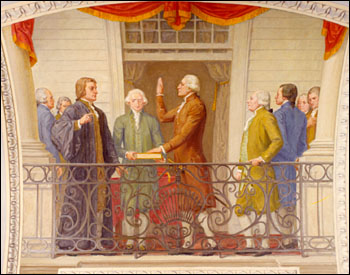
The American electoral system is curious in that we have a number of stages in which the president is elected: the primaries, the general election, and the Electoral College election, and the counting of the Electoral College votes. It raises the question, “When do we have a President-elect?”
The President-elect does not possess legal authority and thus cannot exercise Executive power. Instead, the President-elect has enormous informal influence since he’ll soon be the head of state, and he acquires this status as early as Election Night, if it is clear then that he’s won. Nonetheless, there are a handful of provisions in the U.S. Code and Constitution that refer to the President-elect. Each of these legal provisions need to be considered separately in determining when they affect the President-elect.
Not surprisingly, one important legal reference to the President-elect occurs within the context of the presidential transition. The Presidential Transition Act of 1963, as amended, provides for the smooth transfer of power from one administration to another. According to this act, the Administrator of the General Services Administration (GSA), the agency that provides administrative services to the other government agencies, may make resources available to a President-elect. The Act defines “President-elect” and “Vice President-elect” as the “apparent successful candidates” whom the Administrator determines following the November elections. The Act states that the Administrator may do this beginning the day after the general election, implying that both the Electoral College vote and count are unnecessary for the purposes of this act.
Additionally, Federal law also makes it a Federal offense to threaten, kill, assault, or kidnap the President-elect and Vice President-elect. These sections of the U.S. Code define the President-elect and Vice President-elect as the “apparent successful candidates…as ascertained from the results of the general elections held to determine the electors of President and Vice President.” So for these purposes, the Election Day is the key date to determine the President-elect. Neither the day when electors vote nor the day when the Electoral College votes are counted are decisive. As soon as the dust settles from Election Day, we have a President-elect.
A third provision of law regarding the President-elect is found in the 20th Amendment to the Constitution, which governs how to fill the office of President if the President-elect dies or is found to be ineligible for the Presidency. According to this Amendment, if the President elect is unable to serve, the Vice President elect is to become President. However, the Amendment does not contain any reference to either the general election, or the casting or the counting of the Electoral College votes, leading some to wonder which event is decisive for the purposes of the 20th Amendment. The House committee report that accompanied the 20th Amendment considered the casting of the Electoral College votes, not their counting, as determining when the country has a President-elect. Nonetheless, some legal scholars dispute this. For instance, one notes that the text of the Amendment fails to make that explicit, and the overall context of the Constitution suggests the counting of the electoral votes is when the country has a President-elect. Courts often look to legislative history to settle controversies about the meaning of law, so if this ever became a challenge, it is possible, but not certain, they would default to the casting of the Electoral College votes as the decisive event. No President who came to office via the route provided for in the 20th Amendment would want to have doubts about their legitimacy, so a further Amendment to clarify is in order.
This creates the possibility of some presidential limbo if the presumptive president dies between the time the election occurs and the electoral votes cast, or, God forbid an even worse situation, between the time the electoral votes are cast and the time they are counted by the Congress. Our history only furnishes one example of a candidate dying after the electoral votes were cast. In 1872, Congress decided not to count the three electoral votes Horace Greeley won when he died just after the election. If the presumptive president died before the Electoral College met, the electors could choose to vote for the presumptive vice-president, though there is no constitutional requirement that they do. (That assumes there is no state law directing the electors to vote a particular way.) If the presumptive president dies between the time the electoral college votes and the time the Congress counts the vote, the only precedent would seem to indicate that Congress would not count his votes, sending the election to be decided by the House of Representatives. That could result in the losing candidate being selected by the House if the opposition controlled a majority of state delegations, since the House can only decide between the top three recipients of electoral votes. This is another topic that might be addressed by a revised 20th Amendment.
(For what it is worth, if we are going to clarify the 20th Amendment, the counting, not the casting, of the votes should be decisive. In any election, merely casting ballots is insufficient: The proper authorities need to count them to see who actually won. With respect to the election of the President and the Vice President, the U.S. Code also provides Members of Congress with procedures for challenging the certificates of votes, meaning events in Washington could affect the outcome.)
All of the foregoing about knowing who the President-elect is and when becomes a lot more complicated if no candidate receives a majority of the Electoral College votes. In that case, the House of Representatives must elect the President, which would be well after the general election and the Electoral College votes are cast.